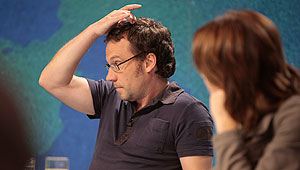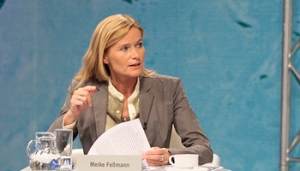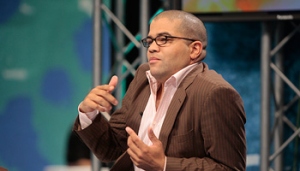 Gregor Sander, Christa Stadler (Bild: ORF/Johannes Puch)
Gregor Sander, Christa Stadler (Bild: ORF/Johannes Puch)
Sander reaped praise from the jury
Gregor Sander opened the reading competition with his story “Winterfisch” (Winter fish). His “GDR anniversary literature” – just in time for the 20th anniversary of the fall of the Berlin wall – triggered a very fierce and nitpicking discussion.
The jury was mostly very taken with the text, but “Winterfisch” did nothing at all for Meike Feßmann. In a series of retrospects, “Winterfisch” tells about life in the former GDR and one who set out to visit his former surrogate father. It turns into a trip to the past. This story of being abandoned in the past and in the present attracted prolonged applause from the audience.
Gregor Sander
Videoporträt
Lesung
Diskussion
 Alain Claude Sulzer (Bild: ORF/Johannes Puch)
Alain Claude Sulzer (Bild: ORF/Johannes Puch)
“It would survive a translation”
“In an unagitated way, the text talks about two separations using very beautiful and calm language”, Alain Claude Sulzer began. Balanced through and through, he liked Sander’s text “very much”. A story about German history – told on a private as well as political level – that “would survive a translation”, the juror praised the text.
A text about the “small, hidden crises”
“The crisis is a giant that has room in any dwarf”, Paul Jandl began his criticism, citing Ernst Jandl. He praised the text about the “small, hidden crises” that are “atmospherically blended into a nature panorama”. “Beautiful and atmospheric”, this text manages to fit surprisingly many biographies onto a small number of pages.
 Gregor Sander (Bild: ORF/Johannes Puch)
Gregor Sander (Bild: ORF/Johannes Puch)
“Imprecise and awkward”
“It is very badly narrated, technically”, Meike Feßmann opposed her colleagues’ praise. Only the voice of the author leads the reader through this “confusion”, the change between present and past is completely “awkward”. “The text contains much clumsiness and uses cinematic tools.” “The text can certainly not be described as being precisely crafted.”
 Meike Feßmann (Bild: ORF/Johannes Puch)
Meike Feßmann (Bild: ORF/Johannes Puch)
“A well-oiled narration machine”
“I would like to object here”, said Karin Fleischanderl. The usually very critical juror praised Sander’s text for being “well-structured dramaturgically”, the narrative levels are well integrated with each other. Her only objection: “It seems to be a bit like a small baking dish, like a well-oiled narration machine, which the author uses to produce stories.”
Mangold is looking for “more agitation”
Ijoma Mangold praised the “excellent subject matter”, which was created through entangling the political fate of a country and individual biographies. “The text asks how one influences the other”, the juror believes, who also praised the text’s “characterisation”. But: “What I don’t find so convincing is the fact that not enough was made of many good motifs. I would have liked to see more agitation.”
 Ijoma Mangold (Bild: ORF/Johannes Puch)
Ijoma Mangold (Bild: ORF/Johannes Puch)
Hildegard E. Keller explained: “With this text, we are on extremely interesting territory, where the Kiel Canal ends. A transhipment point between East and West, home to an unprecedented transport of history. This human story, which is so ‘world-encompassing’ is what makes it so great.”
Spinnen criticises “obsessive punch line at the end”
Finally, Burkhard Spinnen agreed with his colleagues’ praise but noted “justified doubts”: the text, a “calendar story”, was written exactly for the impending 20-year celebrations. “It is an attempt to fit 20 years of German history into a small text.” He doubts whether the text really manages to adequately interlink private biography with history: “I am not quite sure whether the step is not too big.” What’s more, he believes, the text has no open passages, each word is strictly determined and the punch line at the end somewhat “obsessive”.
Barbara Johanna Frank
translated by expectTranslations